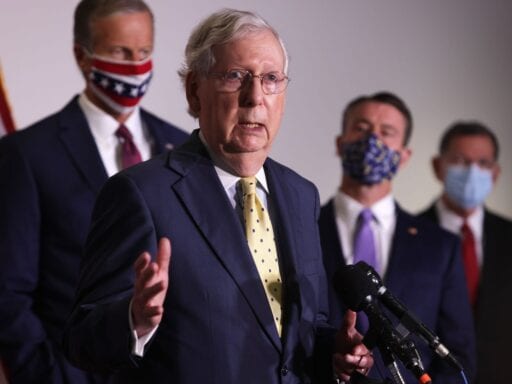Republicans were simply using the vote to send a message.
A Senate vote on Republicans’ “skinny” stimulus bill failed Thursday, leaving lawmakers at the same impasse they’ve been at for months.
The 52-47 vote, which was intended to demonstrate Republican unity and support for the stimulus while putting pressure on Democrats, was only mildly successful in that aim, with 52 Republicans supporting the bill and Sen. Rand Paul voting against it. No Democratic senators, who’ve long pushed for a more expansive stimulus package, voted in favor of it. As a result, the bill was unable to meet the 60-vote threshold it needed to advance.
Republicans’ legislation contained roughly $650 billion in aid, according to the Wall Street Journal, including funding for school reopenings, the US Postal Service, and a weekly $300 supplement to unemployment insurance. Democrats’ more expansive HEROES Act, meanwhile, contained $3 trillion in aid including money for a $600 weekly unemployment supplement, another round of $1,200 stimulus payments, and support for state and local governments, in addition to funding for schools and USPS.
Since Thursday’s vote was a strategic maneuver aimed more at sending a message than producing actual policy, it wasn’t expected to pass to begin with. Instead, it was intended to give vulnerable Republican senators something to point toward as evidence they’ve backed more aid going into the election this fall. The vote was also a way to get Democrats “on the record” opposing stimulus, according to Senate Majority Leader Mitch McConnell — a framing that could be used to cast blame in the coming months, though it ignores the fact that the Democrat-led House passed its own stimulus package months ago.
Overall, things didn’t change much this week. Both parties are still far apart on what a possible deal could look like, even as millions of Americans continue to grapple with unemployment and possible evictions. And increasingly, some lawmakers are acknowledging the possibility that another stimulus package simply isn’t coming in the near term.
“Unless something really broke through, it’s not going to happen,” Senate Appropriations Chair Richard Shelby (R-AL) told reporters earlier this week.
Democrats and Republicans are still far apart on what a stimulus deal should include
Thus far, the contours of the impasse over stimulus have stayed consistent: Democrats have pushed for a more expansive package that would guarantee a weekly $600 supplement for unemployment insurance as well as additional support for state and local governments. Their initial offer started at around $3 trillion and has since gone down to $2.2 trillion.
Conversely, Republicans are interested in something much narrower: Their latest “skinny” stimulus would have offered a weekly $300 supplement for unemployment insurance, with no additional state and local funds or money for another round of stimulus payments.
Treasury Secretary Steven Mnuchin, one of the chief negotiators for the White House, emphasized over the weekend that the president was still interested in backing a new package, but noted that he was keen to support something more “targeted” than Democrats’ proposal.
Neither party has provided much in the way of additional concessions since negotiations that took place before Congress’s August recess, and it’s looking like both might wind up staying dug in through the upcoming election.
There’s notable electoral risk in doing that — as well as significant impact on millions of Americans who are still navigating the dire economic fallout from the pandemic. In August, 29 million people were receiving unemployment insurance, and in the next few months as many as 40 million could face evictions from their homes. According to an August CNBC/Change Research poll, voters in swing states are putting the blame on both parties when it comes to failure to pass additional UI support.
Congress only has a few weeks left, however, before lawmakers are poised to head back to their home states and districts to campaign for the election in November. Given the tight timing they face and the enduring stalemate, the chances of something getting done before their next recess are growing narrower by the day.
Help keep Vox free for all
Millions turn to Vox each month to understand what’s happening in the news, from the coronavirus crisis to a racial reckoning to what is, quite possibly, the most consequential presidential election of our lifetimes. Our mission has never been more vital than it is in this moment: to empower you through understanding. But our distinctive brand of explanatory journalism takes resources. Even when the economy and the news advertising market recovers, your support will be a critical part of sustaining our resource-intensive work. If you have already contributed, thank you. If you haven’t, please consider helping everyone make sense of an increasingly chaotic world: Contribute today from as little as $3.
Author: Li Zhou
Read More



